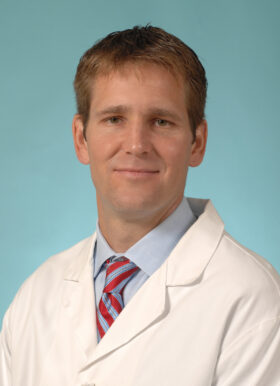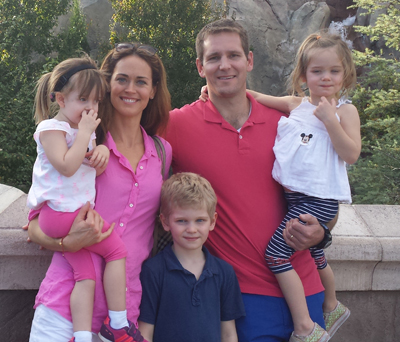Wilson Zachary Ray, MD

Wilson Zachary Ray, MD, is an assistant professor of neurosurgery. His areas of specialty include spinal cord injuries, spinal cord tumors, spinal surgery, nerve transfers, neurological surgery and brachial plexus tumors.
Dr. Ray sees patients at:
The Neurological Cervical Spine Institute and Spine Center in the Center for Advanced Medicine, 4921 Parkview Place, Suite B, 6th floor.
Barnes-Jewish West County Hospital, Medical Building One, 1040 N. Mason Road, Suite 211.
Please call 314-362-3577 for an appointment.
What happened in the course of schooling to influence you to choose your specialty?
Until my 4th year of medical school I was certain I was going to be an orthopedic surgeon. But during my neurosurgery rotation I discovered I absolutely loved everything about neurosurgery – from the neuro-anatomy to the intensity of the specialty. It was a life-changing moment when I discovered this is what I wanted to do.
What was it about neurosurgery that interested you?
I liked orthopedic surgery because I liked working with my hands, but the neuro-anatomy and the technical expertise required for neurosurgery is so fascinating – it hooked me right away. Sometimes I feel like a neurosurgeon trapped in an orthopedic surgeon’s body.

What brought you to Washington University?
I trained here as a resident, and the program chairman, Dr. Ralph Dacey, played a big part in my decision to return. He has built a great program that offers not only the opportunity for research, but the ability to apply that research directly to patient care. The environment here at Washington University is like no other.
Which aspect of your practice do you find most interesting?
I like to take care of patients with spinal cord injuries and spinal oncology patients. As a tertiary referral center, we tend to get a lot of patients with complex spinal reconstructions and spinal cord trauma.
Are there new developments on the horizon?
There are some pretty amazing innovations affecting our ability to predict which patients with spinal cord injuries are going to respond to therapy and recover with treatment. The increased understanding of the physiology of spinal cord injury and issues with secondary injury are going to increase our ability to treat these patients with better outcomes.
For instance, the jury is still out on the use of therapeutic hypothermia (lowering the body’s core temperature) as a viable treatment to minimize permanent damage after a spinal cord injury. That’s another example of understanding the mechanisms of secondary injury in order to improve a patient’s outcome.
What type of research are you involved in?
I just received a National Institutes in Health (NIH) grant to study spinal cord imaging. We are interested in the prognostication of patients after spinal cord injury – using metrics from non-invasive imaging bio markers to predict why some patients recover full function, while others fail to make any improvement.
We are hopeful the results of this study will ultimately be applied to patients who come through the emergency room or are admitted to the hospital with acute spinal cord injuries. This study will also help guide future clinical trials as we evaluate new neuro-protective and neuro-regenerative possibilities.
What are the most common causes of spinal cord injury?
It tends to be car accidents, motorcycle accidents, and ATV accidents. Surprisingly, in this day and age we still see a lot of people who come in with injuries because they were unrestrained. It’s amazing, you think everybody wears a seat belt, but it’s clearly not the case.
Wearing bike helmets has made such a dramatic difference in terms of bicycle accidents. It only holds true that if you wear a helmet riding a bike or a scooter, you are going to have a better outcome if you are in an accident.
Where are you from?
I’m from Iowa. I figured I would end up on one of the coasts, but I like the Midwest and it’s worked out well for me and my family.
Is there a particular award or achievement that is most gratifying?
More than any award, my family is my best achievement. I have a great wife and three great kids. While I’m proud of my awards, my family is most important above everything else.
What is the best piece of advice you’ve received?
Work hard every day. Spend time with your family.
Did you have a mentor?
Yes, as I mentioned I trained here and the department chair, Dr. Dacey, was a big part of my training and development as a neurosurgeon. He’s given me a lot of advice and a big part of why I came back here.
If you weren’t a doctor, what do you think you would be doing?
I really can’t imagine doing anything else – so I’d probably be a researcher in biology or chemistry. As long as I can remember, even in grade school, I wanted to be a doctor.